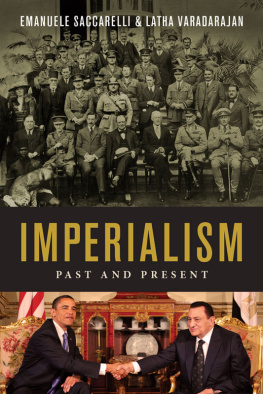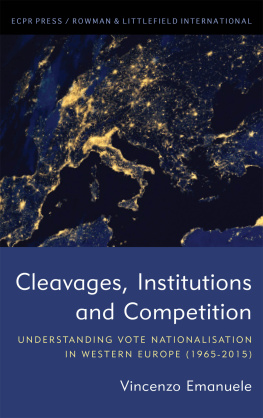Saccarelli Emanuele - Imperialism Past and Present
Here you can read online Saccarelli Emanuele - Imperialism Past and Present full text of the book (entire story) in english for free. Download pdf and epub, get meaning, cover and reviews about this ebook. year: 2015, publisher: Oxford University Press, genre: Politics. Description of the work, (preface) as well as reviews are available. Best literature library LitArk.com created for fans of good reading and offers a wide selection of genres:
Romance novel
Science fiction
Adventure
Detective
Science
History
Home and family
Prose
Art
Politics
Computer
Non-fiction
Religion
Business
Children
Humor
Choose a favorite category and find really read worthwhile books. Enjoy immersion in the world of imagination, feel the emotions of the characters or learn something new for yourself, make an fascinating discovery.
- Book:Imperialism Past and Present
- Author:
- Publisher:Oxford University Press
- Genre:
- Year:2015
- Rating:5 / 5
- Favourites:Add to favourites
- Your mark:
- 100
- 1
- 2
- 3
- 4
- 5
Imperialism Past and Present: summary, description and annotation
We offer to read an annotation, description, summary or preface (depends on what the author of the book "Imperialism Past and Present" wrote himself). If you haven't found the necessary information about the book — write in the comments, we will try to find it.
Imperialism Past and Present — read online for free the complete book (whole text) full work
Below is the text of the book, divided by pages. System saving the place of the last page read, allows you to conveniently read the book "Imperialism Past and Present" online for free, without having to search again every time where you left off. Put a bookmark, and you can go to the page where you finished reading at any time.
Font size:
Interval:
Bookmark:

IMPERIALISM PAST AND PRESENT

Oxford University Press is a department of the University of Oxford. It furthers the Universitys objective of excellence in research, scholarship, and education by publishing worldwide. Oxford is a registered trade mark of Oxford University Press in the UK and in certain other countries
Published in the United States of America by Oxford University Press 198 Madison Avenue, New York, NY 10016, United States of America
Oxford University Press 2015
All rights reserved. No part of this publication may be reproduced, stored in a retrieval system, or transmitted, in any form or by any means, without the prior permission in writing of Oxford University Press, or as expressly permitted by law, by license, or under terms agreed with the appropriate reproduction rights organization. Inquiries concerning reproduction outside the scope of the above should be sent to the Rights Department, Oxford University Press, at the address above.
You must not circulate this work in any other form and you must impose this same condition on any acquirer
Library of Congress Cataloging-in-Publication Data
Saccarelli, Emanuele, 1971
Imperialism past and present / Emanuele Saccarelli and Latha Varadarajan.
p.cm.
Includes bibliographical references and index.
ISBN 9780199397914 (ebook) 1. ImperialismHistory. 2. ImperialismPhilosophy. I. Varadarajan, Latha. II. Title.
JC359.S25 2015
325'.32dc23
2015006793
987654321
Printed in the United States of America on acid-free paper
In lieu of Francesco
IMPERIALISM PAST AND PRESENT
Fine fellows cannibals in their place. They were men one could work with
Joseph Conrad, Heart of Darkness
In 2010, a disturbing report made its unwelcome entry into an already tumultuous news cycle. Members of a U.S. Army brigade, assembled in a self-proclaimed kill team, had indiscriminately targeted civilians in southern Afghanistan. As trophies for their deeds, the soldiers collected fingers, leg bones, and skulls from their victims. Photos taken by the soldiers posing next to dead bodies came to light, along with the fact that the main instigator kept tally of each victim by having skulls tattooed on his calf. Three years later, a particularly gruesome video was made available on YouTube, to the dismay of its international audience. The footage, which has since been seen by over a million people, shows a man desecrating the corpse of a uniformed Syrian Army soldier. The perpetrator, also dressed in military fatigues, completes his work by pulling out the soldiers heart. Then, shockingly, he sinks his teeth in it.
Such news reports, though a recurring feature of contemporary life, trace a predictable arc in and out of public consciousness. The initial horror evoked by their gory details quickly subsides in the face of official reassurances and the unrelenting tide of news of the more soothing or stultifying kind. Insofar as they involve armed forces of democratic and civilized powers, or reliable, if publicly embarrassing, allies, officials and commentators are quick to dismiss these events as aberrations. Should the public seek to draw lasting political conclusions from such horrors, it will be predictably reminded that there is only one: the atavistic darkness lurking in the hearts of man since the emergence of the species. In covering the act of cannibalism in Syria, for example, the BBC was prepared to admit that It is a reminder of the horror and bestiality of warfare, only to then ask, rhetorically, and as a way to put the matter to rest: But does it tell us anything more than that? And so it goes, from one aberration to another, from one lesson intended to teach nothing in the end to another, with remarkable continuity.
Even a cursory reflection on the available facts, however, shows that these atrocities were not aberrations committed in a political vacuum. Khalid al-Hamad, the cannibal in Syria, was not an amateur when it came to horrific acts. His response to his newfound international celebrity was an offer to share with the audience other videos, including one in which he cut another victim to pieces with a saw. Rather than just a deranged sadist, however, al-Hamad turned out to be a significant military and political figure. As the head of the Farouq Brigade, he directed the work of one of the largest and most powerful militias constituting the Free Syrian Army in its bloody civil war against the Assad government.
There is, moreover, nothing civil about the Syrian conflict, and not just for the obvious reasons illustrated in al-Hamads video. The Farouq Brigade, regarded as one of the moderate Islamist sections of the Free Syrian Army, receives the support of Turkey and the conservative sheikhdoms of the Persian Gulf, while Assads forces have the backing of the Lebanon-based Hezbollah and the Iranian government. In turn, lurking behind the regional powers involved in the conflict stand broader geopolitical forces as well. Western democracies have thrown their support behind the Syrian rebels, while Russia, which under the Assad government has access to its only naval base in the Mediterranean, opposes its ousting.
Similarly, the atrocities reported in Afghanistan are far less shocking once seen in their proper context. The war started in October 2001 with Operation Enduring Freedom. Since then, freedom has proved elusive, as the occupation continues to prop up a government that is widely regarded as unspeakably corrupt, along with a number of lesser warlords and satraps. But the war has certainly been enduring, having gained the dubious distinction of becoming the longest war in American history. While it is difficult to estimate the amount of casualties involved, few doubt that Afghanistan has been the site of unrelenting and hardly surgical violence, carried out by various means. Drone strikes, questionably presented as a sanitized alternative to traditional warfare, have in any case found their complement in the unrestrained savagery of the bone-collecting kill team. In the context of such a brutal and prolonged conflict, the latter can in no sense be regarded as an isolated incident.
Significantly, the gruesome details of this story came to light as a result of an investigation that was triggered by the complaints not of Afghan civilians, but of a fellow American soldier who was subjected to threats and abuse. Brutalities of this sort, moreover, are standard fare in modern history. Calvin Gibbs, the main instigator of the kill team in Afghanistan, bragged about having done the same things during the occupation of Iraq. But collecting the remains of the enemy was also widely practiced by American soldiers during the Vietnam War. And when Gibbs referred to the victims of his grisly deeds as dirty savages, he was, consciously or not, tapping into a well-entrenched history of conquest and occupation.
A more sensible accounting of the atrocities in Afghanistan and Syria, then, cannot take place without addressing their troubling continuities with a longer history. The recent events in Syria have a series of important precedents, from the early twentieth-century British protectorates in the Middle East, to the more recent overthrow and brutal killing of Muammar Qaddafi by some of the same elements now active against Assad, aided and abetted by the same foreign powers. While the ongoing quagmire in Afghanistan has its own distinctive and brutal history, it should not be difficult to recognize it as a new chapter of the classic great game pitting rival powers against each other in the region since the nineteenth century.
Font size:
Interval:
Bookmark:
Similar books «Imperialism Past and Present»
Look at similar books to Imperialism Past and Present. We have selected literature similar in name and meaning in the hope of providing readers with more options to find new, interesting, not yet read works.
Discussion, reviews of the book Imperialism Past and Present and just readers' own opinions. Leave your comments, write what you think about the work, its meaning or the main characters. Specify what exactly you liked and what you didn't like, and why you think so.












![Emanuele Feronato [Emanuele Feronato] - Flash Game Development by Example](/uploads/posts/book/120345/thumbs/emanuele-feronato-emanuele-feronato-flash-game.jpg)